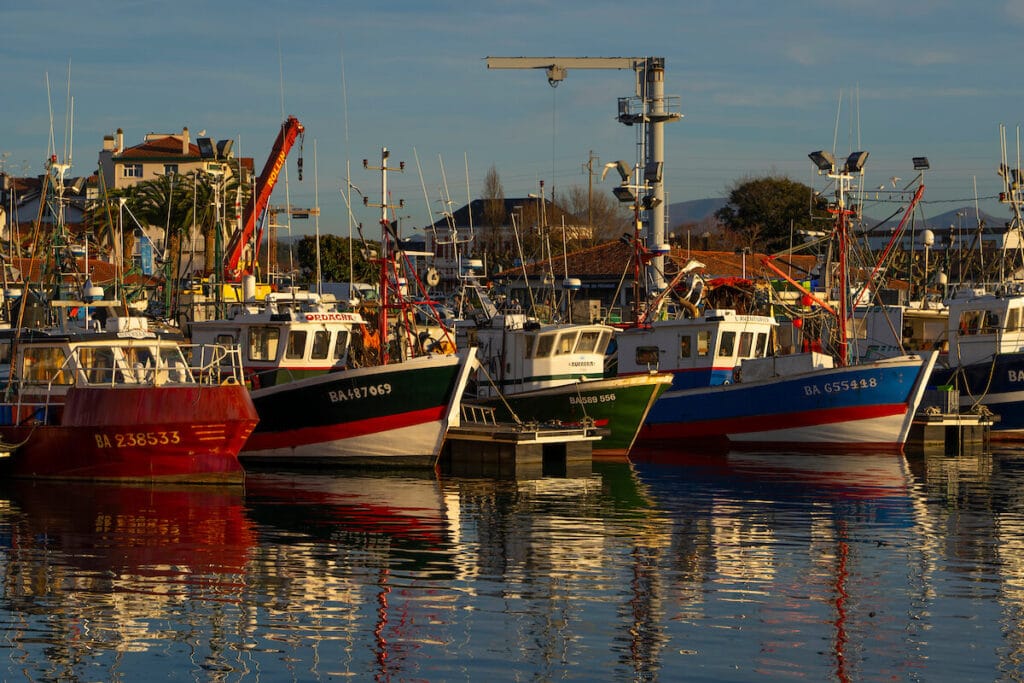
Small-scale fishing vessels in Saint-Jean de Luz, France. Photograph: Dave Walsh. Not for resale/distribution.
Brussels, 21 February 2023:- Responding to the European Commission’s publication today of a package of EU Action Plans aimed at addressing the biodiversity and climate crises in the ocean and fisheries, Our Fish Programme Director Rebecca Hubbard said:
“The ocean’s ability to provide us with life support systems like food and carbon sequestration is under threat as a result of the increasingly severe impacts of overfishing, human-induced climate change and pollution, yet the European Commission has today delivered inaction plans that fail to jump the chasm from lofty rhetoric to a roadmap for meaningful action that would both transform European fisheries and address the planetary crisis”.
Born out of the European Green Deal and President von der Leyen’s commitment to address the nature and climate crises, The EU Action Plan: Protecting and restoring marine ecosystems for sustainable and resilient fisheries (“Marine action plan”), along with the EU Action Plan: Energy transition of EU fisheries and aquaculture, and the Functioning of the Common Fisheries Policy (CFP) report, were released on February 21, following months of delay [2,3,4].
“While we welcome the European Commission’s Marine Action Plan’s proposal to map seabed carbon and the impact of bottom trawling in EU waters, the proposal is too little, too slow and fails to address extraction of fish and CO2 emissions”, said Hubbard. “The EU must end the ploughing up of seabed carbon stores, the excessive removal of the ocean’s carbon engineers such as fish, and the CO2 emissions from vessels burning subsidised fossil fuel. These practices are neither good fisheries management nor good carbon management and the Commission’s Marine Action Plan fails to put this right within the urgent timeframes we need.”
“More positively, in its report on the Evaluation of the functioning of the Common Fisheries Policy, the European Commission has taken important steps forward in committing to develop an economic tool that properly values natural marine ecosystem services to society and developing a guide for EU member states to utilise environmental, social and economic criteria for the allocation of fishing quota. By allocating access to fish based on environmental or social performance criteria, the EU can drive the transition to a low-carbon, low-impact fishing fleet that restores the ocean and delivers thriving fisheries.”
“However the proposed EU Action Plan: Energy transition of EU fisheries and aquaculture appears to be more of a discussion paper than an ‘action plan’. An economic incentive is clearly needed to drive the decarbonisation of the EU fishing sector, along with a financial penalty for failing to implement it. In addition, the Energy Taxation Directive must eliminate all fuel subsidies, while the European Maritime, Fisheries and Aquaculture Fund (EMFAF) must be updated to require that at least 35% of any support goes to transitioning to low impact and low carbon fishing – anything less is gross hypocrisy.”
“This Commission and European Parliament have just over a year left in their mandates, yet the climate and biodiversity emergency does not stand for election or wait for endorsement. The time for grand talk is over – Our Fish is calling on the European Commission and EU member state governments to ditch the rhetoric and take definitive action, by immediately beginning to implement and strengthen the measures described in these proposals, and for Members of the European Parliament to support them in doing so”, concluded Hubbard.
In May 2021, sixteen European NGOs published a detailed ‘shadow action plan’ to provide key recommendations for the European Commission’s Action plan to conserve fisheries resources and protect marine ecosystems and to demonstrate the level of ambition and timeline that we expect it to deliver [5].
ENDS
Contact: Dave Walsh, press@our.fish, +34 691 826 764
Notes:
[1] Fisheries, aquaculture and marine ecosystems: transition to clean energy and ecosystem protection for more sustainability and resilience
https://ec.europa.eu/commission/presscorner/detail/en/ip_23_828
[2] EU Action Plan: Protecting and restoring marine ecosystems for sustainable and resilient fisheries
[3] Evaluation of the functioning of the Common Fisheries Policy
[4] EU Action Plan: Energy transition of EU fisheries and aquaculture
[5] Joint NGO Shadow Action Plan: Realising the Ambition of the EU Biodiversity Strategy in the Ocean: Key recommendations for the European Commission’s Action plan to conserve fisheries resources and protect marine ecosystems
About Our Fish
Our Fish is working to end overfishing and restore a healthy ocean ecosystem.
By collaborating with others, and deploying robust evidence, we are calling for an end to overfishing as a critical and significant action to address the biodiversity and climate crisis.
